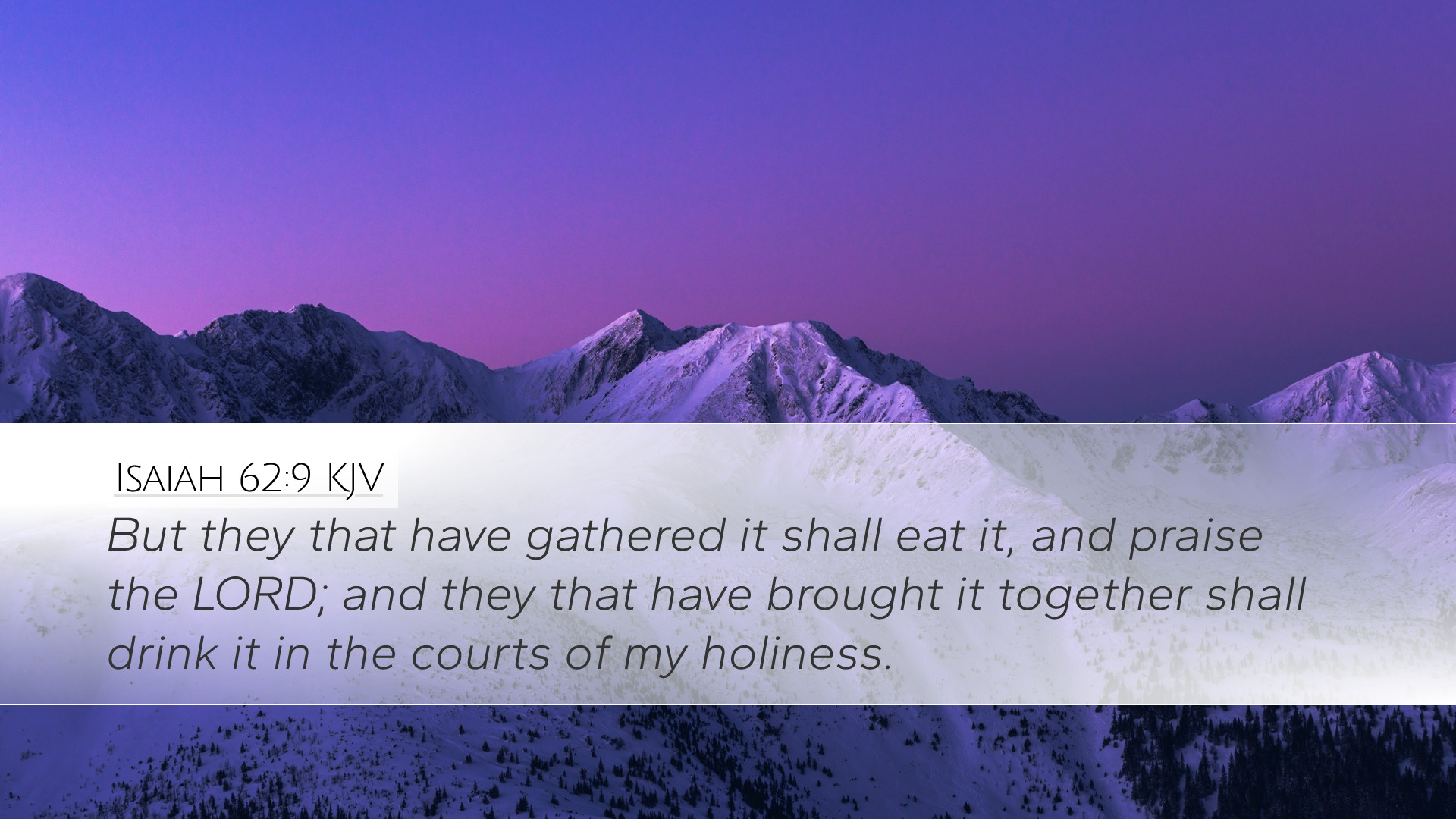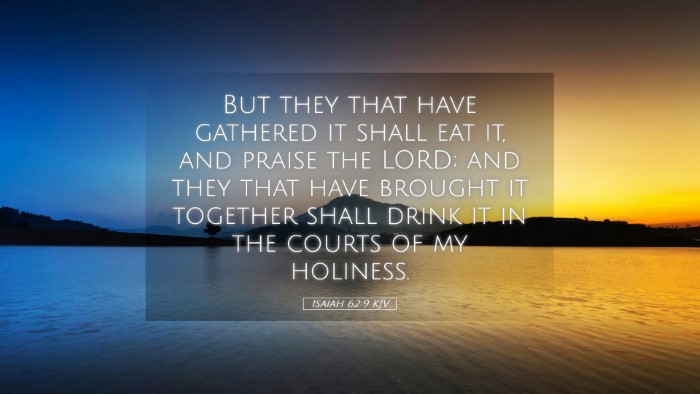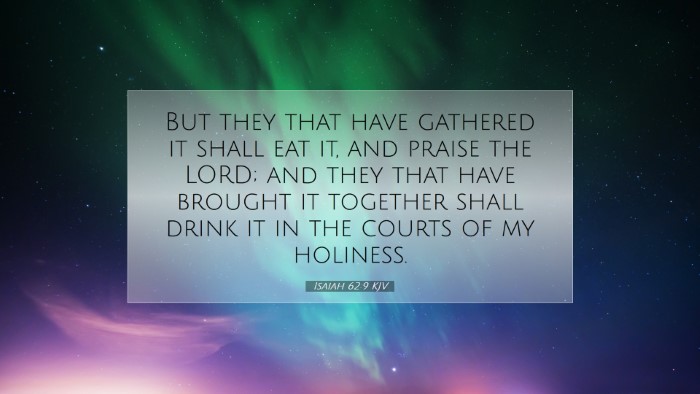Commentary on Isaiah 62:9
Verse: "But they that have gathered it shall eat it, and praise the LORD; and they that have brought it together shall drink it in the courts of my holiness."
Introduction
This verse from Isaiah serves as a poignant reminder of God's provision and the necessary response of His people. It reflects the themes of harvest, gratitude, and divine holiness. Exploring the insights from the public domain commentaries reveals a rich tapestry of meanings embedded within this verse, pertinent for pastors, students, theologians, and Bible scholars.
Contextual Background
Isaiah's prophecies are set against a backdrop of Israel’s tumultuous history, characterized by exile and hope for restoration. Chapter 62, in particular, emphasizes God's unwavering commitment to His people and the future glory of Zion. The verse encapsulates a moment of celebration and communal rejoicing in God’s blessings post-restoration.
Verse Breakdown
-
“But they that have gathered it shall eat it”:
This phrase can symbolize the faithful servants of God who labor in His vineyard. Matthew Henry notes that those who work for God will ultimately partake of the rewards. The gathering signifies the harvest—a product of divine grace and human toil.
-
“and praise the LORD”:
The act of eating and then praising emphasizes the correct response to God’s provision. Albert Barnes interprets this as a link to thankfulness that should always accompany God’s gifts. To consume the abundance without praise would signify ingratitude.
-
“and they that have brought it together”:
Adam Clarke refers to this as an acknowledgment of the efforts of those who have worked to gather and unite the blessings from various sources—a collective effort that mirrors the body of Christ today.
-
“shall drink it in the courts of my holiness”:
This part of the verse underscores the sacred nature of God's provision. The courts indicate a place of worship, highlighting that all blessings come from God and must be celebrated in a holy context. Barnes suggests that this is indicative of a joy that reaches its full expression in the presence of the Lord.
Theological Implications
This verse invites deep theological reflection on the nature of God's blessings and worship. It reinforces the conception of God's community gathering to share in the abundance He provides, thus building a communal identity centered around gratitude.
1. Divine Provision
At its core, the verse emphasizes divine provision—both physical and spiritual. Those who gather and enjoy the fruits of the labor are a metaphor for the Church, highlighting God’s faithfulness in sustaining His people. Clark elaborates that it illustrates God’s providence in supplying needs and the resulting joy should naturally spill over into worship.
2. Corporate Worship
The act of drinking “in the courts of my holiness” speaks volumes about the nature of corporate worship. It represents a united body celebrating the goodness of God, which is necessary for personal sanctification. Henry notes that worship in the courts is more than a personal retreat; it is a communal acknowledgment of God's grace.
3. Eschatological Hope
Furthermore, scholars agree that this passage holds eschatological significance—pointing towards the ultimate fulfillment found in the New Heaven and New Earth, where God's people will eternally rejoice in His presence. There is an emphasis on hope, encouraging believers to look forward not only to physical sustenance but the eternal communion we anticipate with God.
Practical Applications
For pastors and church leaders, Isaiah 62:9 provides a framework for encouraging congregations to engage in both stewardship and worship. It reminds leaders that as they guide people to serve, they simultaneously are preparing them to encounter and praise God for His provision.
1. Stewardship and Service
The call to gather indicates that communities should actively participate in God's work, whether through service, outreach, or sharing resources. This verse can provoke conversations around stewardship, reminding church members that working together leads to collective blessings.
2. Cultivating a Culture of Gratitude
In leading worship, the expression of gratitude should be emphasized continually. It is vital to cultivate a culture that recognizes and articulates thanks for God's provisions, encouraging congregants to share testimonies of God's faithfulness.
3. Fostering Community and Fellowship
Encouraging gatherings in both formal and informal settings allow for communal acknowledgment of God’s blessings. As people bring their experiences and stories of God's provision, the community strengthens its bond, glorifying God together.
Conclusion
Isaiah 62:9 serves as a rich vein of theological and practical insights. For those who delve into its meaning, the verse encapsulates the essence of God’s faithfulness, the importance of communal worship, and the call to live in gratitude. Through reading and studying this passage, believers are prompted to reflect on their own roles within the divine plan and to actively participate in the celebration of God’s abundant grace.


